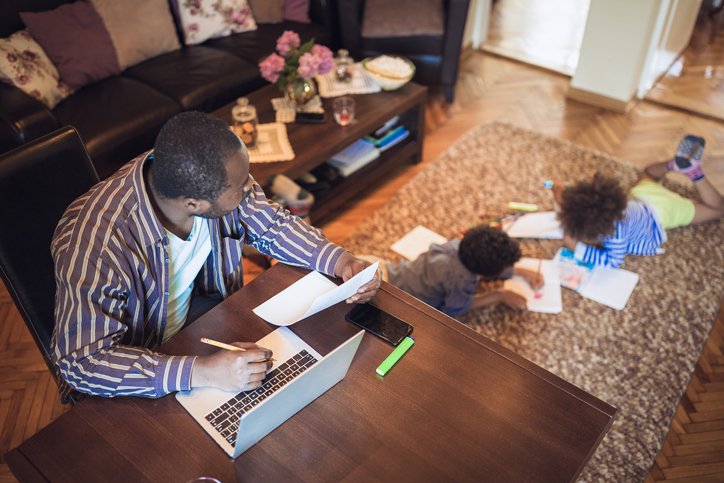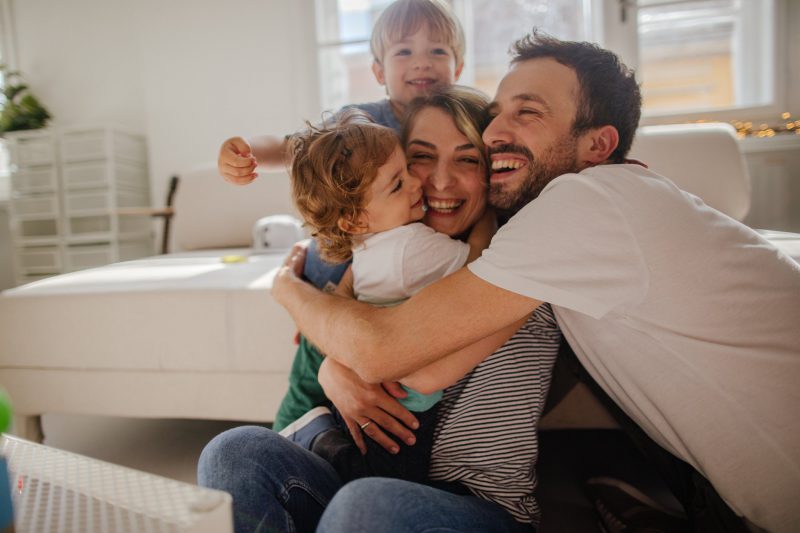
As families throughout the United States navigate the possibility of back-to-school, many feel a complicated sense of relief that children may return to school and normal routines and services could possibly continue.
That sense of relief quickly fades when the reality of “the new normal” sets in: school will be different. School services will be different. The unknown of what returning to school looks like is constantly lurking. Teachers, staff, and families are all feeling it.
I was blessed with the opportunity to talk with Angie Walston, whose heart and soul is wrapped up in studying developmental psychology and family theory. Angie wears a lot of hats, including wife, mom, curriculum developer, writer, adviser, and pastor’s wife. Angie currently works at Maryville University, and our paths crossed while our husbands were classmates at Concordia Seminary in St. Louis, MO.
It’s hard not to hang on every word Angie says because she has this reassuring authenticity about her that- paired with her expertise in developmental psychology- makes it quite clear that she is the real deal. When Angie gives advice, it’s not like trying to take smoothie recommendations from Reese Witherspoon (TWO heads of romaine??)
Angie’s tips actually seem possible.
1. Morning Temperature Check.
I have become so accustomed to the daily temperature checks my children’s daycare performs before allowing them to enter. This is normal now. But, Angie is talking about doing an emotional “temperature check” in your own household each morning. Angie shared that she and her husband take a moment to observe their kids and ask them how they are doing today. This allows each kid to feel seen and helps Angie and her husband prioritize the day’s tasks. Knowing how your children are feeling as they prepare for their days can help avoid misunderstandings and unnecessary conflict. We all know this to be true, but sometimes having a reminder to check in with each child for a few minutes helps kick-start the day with positivity. Additionally, taking a moment to check in with each kid strengthens the whole family system that exists in your home.
As school approaches and new procedures and routines take place, the routine of the “morning emotional temperature check” will help children (and parents) identify their emotions and speak up for what they need, thus building emotional resilience.

What happens if someone in your household takes their emotional temperature and is unwell?
Take a sick day. As a society, we aren’t totally comfortable with using sick days for mental health and wellness yet, but Angie is a huge advocate for this. She suggests taking a mental health day when you need to and modeling this for your families. Children need to learn to prioritize their mental wellness, too.
2. Routine > Schedule.
The combination of multiple humans in one living space plus external demands, such as work and school, can easily leave each family member physically and emotionally depleted at the end of the day. Continuing to prioritize a routine instead of prioritizing a schedule even in the midst of the back-to-school/work transition can help families keep expectations in check.
So, parents: don’t overthink your routine. Remember that routines are simply the regular habits you do in a day. Approaching the tasks of the day through the lens of “routine instead of schedule” allows for both flexibility and accountability. It also helps families prioritize the absolute most important tasks that need to be completed in a day.
No matter what your family looks like, this can be a great way to help prioritize restful, life-giving habits. Getting in the routine of going for a walk or playing a game with a family member are great ways to find balance in your day. As families consider the possibility of returning to school and how different things could look, emphasizing the routine over the schedule leaves the emotional margin necessary when we experience forced changes. Yes, of course, there are always scheduled meetings and set times for being places, but your schedule does not rule over you.
3. Modeling Care and Authentic Emotional Language.
Any parent who has discovered this practice knows how effective authentic emotional language can be. Angie reminded me that when we talk about how we’re actually feeling, it allows the whole family system to show care to one another. When we’re all stuck at home together and empathy is running low, we all need to pitch in and help take care of each other. Don’t beat yourself up if you lose your temper on the people in your household. (Guilty.) Own your lack of empathy and apologize for the blow-up.
4. Owning What We Do.
Angie said that her kids overwhelmingly have loved the extra family time without a doubt. The simpler lifestyle has Angie, her husband, and her kids coming together to decide how to move forward. “Our kids have expressed a desire to continue the simple, so we’re saying ‘no’ to high-value things in order to continue [the simple life.]”
Angie and her husband sat down with their kids and challenged them to think through why they do certain activities. “Why do I do this activity? What would happen if I didn’t do this activity anymore? If I don’t do this activity, what will I have time for?” For Angie’s family, this meant sticking with gymnastics and swimming, but passing on basketball this year. So much is out of our control, but there are still things you can decide and own about how your family operates in relationship to each other as well as the community.
5. Honesty about Knowns & Unknowns.
Angie suggests being very honest with your kids about what you know and what you don’t know about what’s going on when it comes to back-to-school plans. Saying, “I don’t know now, but when I do know, I will tell you” doesn’t cure a child’s anxiety about the unknown, but it gives parents an honest and simple way to respond. If your child is sensitive to anxiety, consider scheduling a video walk-through of the classroom. Many teachers are hosting 1:1 Zoom chats with their students in lieu of Back-to-School Night. Previewing some of the known procedural changes ahead of time might help an apprehensive child.
As school approaches and new procedures and routines take place, the routine of the "morning emotional temperature check" will help children (and parents) identify their emotions and speak up for what they need, thus building emotional resilience.
This is a time when authentic emotional language can be especially helpful. The other day, my daughter asked when Coronavirus was going to be over. We ended up talking about it, and I said, “Sometimes I feel frustrated about not knowing what’s going to happen, too. What is a healthy way we can work through this?” We talked some more, and then we played UNO, and I actually felt more content about “living in the flex zone” as Angie would say.
6. Partnering for Positivity.
When it comes to education, Angie stated it simply: “This is a big system, and we all impact each other. The system is stressed right now, and nobody has been trained for this.” Remembering this reality helps parents and teachers express grace toward each other and for the students who are affected. Teachers had an incredibly stressful school year, and their start to this next school year already has additional stress.
How should parents handle frustrations they have with teachers?
Parents, it’s up to you to determine what’s best for your family. When I asked Angie, her response was that in this crazy time, unless the problem at-hand is damaging to your child, put it aside. Issues will arise, and this can be a great opportunity to help older children advocate for themselves. Simply, be there to support.
Giving teachers an update of how things are going with at-home learning is really helpful. Angie spoke from experience when she remarked how useful a simple update was for her children’s teachers. Sometimes, with two working parents, parents have to know what are the “have-to-get-dones” in a day, and it’s good for teachers to know what their students’ families are up against.
Angie is not advocating for the bare minimum, here. Quarantine life requires us to take turns more than we’re used to, and this extends to intangible things like Internet bandwidth and vocational responsibilities. Teachers and parents can work together to reach an understanding of how to move forward when expectations collide.
In all of this, Angie emphasized patience above all else. We must be patient with ourselves and our children. Remembering that this is a forced change for everyone can help us be more gracious to ourselves when we need more rest or when we’re going stir crazy. Quarantine life has shown many of us that we need to adjust our own expectations and the expectations we knowingly or inadvertently put on those in our homes and communities. We’re unsure of what back-to-school looks like, and it will probably be different across our country. My hope for you isn’t that you get your act together, but rather that you join me in embracing patience as we continue to move forward during uncertain times. Together, may we find the strength to put on patience and kindness toward ourselves and our neighbors.
— Vanessa Lane is the Content Marketing Lead at Concordia University and can be reached at vanessa.lane@cuaa.edu. When she's not at work, she can be found playing with her kids or watching NBA basketball with her husband.
If this story has inspired you, why not explore how you can help further Concordia's mission through giving.